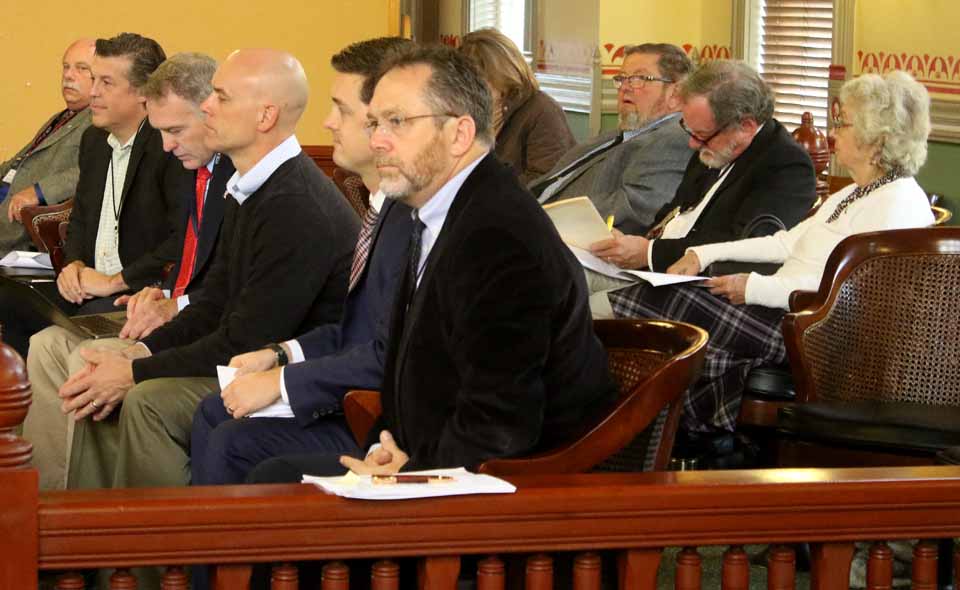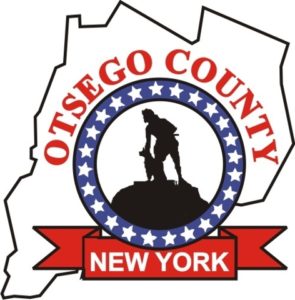WITH 6 DAYS TO ELECTION…
County Board OKs
Nepotism Policy,
Fills Ethics Board

By JIM KEVLIN • Special to www.AllOTSEGO.com
 COOPERSTOWN – With six days to go to a briskly contested Election Day, the Otsego County Board of Representatives today acted on two ethics questions it has struggled with for months, even years:
COOPERSTOWN – With six days to go to a briskly contested Election Day, the Otsego County Board of Representatives today acted on two ethics questions it has struggled with for months, even years:
- One, appointing three members to a county Board of Ethics, created in the early 1990s but never populated.
- Two, adopting a nepotism policy that limits situations in which close relatives can work for other close relatives in Otsego County government.
Both measures were approved unanimously this morning at the county Board’s November meeting. In the absence of both ranking members, chair Kathy Clark, R-Otego, and vice chair Ed Frazier, R-Unadilla. county Rep. Craig Gelbsman, the Admin Committee chair, filled the seat.
3 ON ETHICS BOARD
Accepting ethics board appointments were former Oneonta mayor Kim Muller, a Democrat, one year; Michelle Catan, a Democratic director of the state Small Business Development Center, Oneonta, two years, and Jack Henson, a Republican and retiring county Veterans Services director, three years.
The county is required to have representation from both parties, and is required to include one county employee. Also, all members serve three year terms; they were staggered in forming the board, so one term will expire every year.
The three were proposed by county Rep. David Bliss, who made it a personal mission in recent months to find people to take the job. To his surprise, he told his colleagues, it was a tough sell. At first, people were interested, but when they realized the responsibilities, they stepped back.
Bliss had experience with a Board of Ethics as Middlefield town supervisor. Such boards, he said, only go into session when called upon, and in his 23 years at Middlefield’s helm, no complaint was ever made. He said, however, that just having the board is useful in reassuring citizens all is above board.
At the county level, Maria Ajello, who lost her Town of Richfield home in the county’s 2014 tax auction, has repeatedly said she will bring a complaint to the ethics board, and Bliss said he assumes she will. One of her concerns is that a county employee bid for her property at the auction, something that is prohibited in other counties.
NEPOTISM LAW APPROVED
The nepotism policy falls short of outright banning employees from reporting to close relatives, but acting chair Gelbsman said the wording was drafted by the county’s labor attorney.
The policy – in the form of a local law, adopted today – said “no county officer or employee may directly or indirectly supervise a relative.” However, it then contains this caveat: “… unless such supervisor is in compliance with an individual written plan that has been proposed by the affected department in conjunction with the personnel officer and reported to the appropriate committee to which the particular department reports.”
Regardless, Gelbsman said, some regulation of nepotism is better than no regulation, which has been the case to date. The idea, he added, is to protect the rights of people now working in situations that might be defined as nepotistic.
Further, the Board of Elections is exempt from the regulations. County Attorney Ellen Coccoma said it is specified in state law that county boards have no regulatory authority over boards of election, to forestall any interference with the objectivity of elections.
The issue of relatives working for each other was dramatized this year by disciplinary actions brought against the son of Sheriff Richard J. Devlin Jr. who worked as a guard in the county jail, which is under his father’s jurisdiction. However, it’s been noted that there are at least eight situations where a relative is working for a close relative in county government.
The new nepotism policy defines “relative” as “parent, step-parent, spouse, spouse equivalent, domestic partner, sibling, step-sibling, sibling’s spouse, child, step-child, grandparent, parent of spouse or spouse equivalent or domestic partner, including in-laws and members of the house of a county officer or employee, and individuals having any of these relationships to the spouse of a county officer, or employee, or appointed or elected official.”

